MD4044 Entrepreneurship Theory & Practice Report: Bezos and Amazon
VerifiedAdded on 2023/04/21
|10
|3157
|291
Report
AI Summary
This report provides a comprehensive analysis of entrepreneurship, exploring its nature, roles, and the challenges faced by entrepreneurs. It delves into the critical aspects of decision-making, ethical considerations, and legal disputes, using Jeff Bezos and Amazon as a case study. The report examines the role of entrepreneurship in fostering a strong economy, and then critically analyzes the difficult decisions, ethical challenges, and legal issues faced by Jeff Bezos in building Amazon. It discusses Amazon's innovative strategies, its impact on the e-commerce market, and the company's responses to market demands. The report also highlights ethical dilemmas such as high ethical standards, unhealthy competition, human costs, and unfair ranking frameworks within Amazon. Finally, it addresses legal disputes involving Amazon, including patent lawsuits and accusations of anti-competitive practices. Overall, the report offers insights into the complexities of entrepreneurship in a rapidly evolving business environment.

Running Head: EP 0
Entrepreneurship
1/10/2019
Entrepreneurship
1/10/2019
Paraphrase This Document
Need a fresh take? Get an instant paraphrase of this document with our AI Paraphraser

EP 1
Introduction
Entrepreneurship is the act of starting a business on your own grounds instead of working for
someone else by utilizing all the concepts and qualities of leadership, motivation, and
decision-making. It incorporates not only to lead to setting up a business but also the growth
and development. It is a constant economic process, which identifies to need to change and
initiate the change quickly and effectively. They are specified as a strong pillar of the
company as they maintain a strong bond with the employees and stakeholders. According to
H.N Patak, entrepreneurship incorporates a wide range of area, which is coupled into three
categories i.e. managing a business, running the business, and perception of an opportunity. It
plays a significant part in the aspect of developing country like the United Kingdom, which is
challenged with major economic-social problems. It is constantly associated with the
development and management of small firms. It assists in recognizing the solution to the
major problems of the United Kingdom such as exploitation, development of economic
power, and regional imbalances. It assists in attaining the success and growth of the
organization for the near future (Gill, 2017). In the following, an effort has been made to
discuss the nature of entrepreneurship, difficult problem and legal disputes faced by the well-
known entrepreneur.
Nature of entrepreneurship
The nature of entrepreneurship involves-
Risk-bearing- This is an important aspect of entrepreneurship as the ability or spirit
of bearing risks. In the contemporary business, risk bearing is the most important
factor because of increasing competition in the business. The entrepreneurs face
various risks carrying from the starting of the business until operations (Gurtoo and
Williams, 2016).
Capability to Innovate-Entrepreneurship is an innovative activity through which
new ideas and convictions may be implemented. It gives full concentration to new
technology, opportunities, and methods (Suddaby, Bruton and Si, 2015).
Business-Oriented attitude- Entrepreneurship is a business-oriented attitude as it
offers inspirations to individuals and organizations for developing business (Kuratko,
Morris and Schindehutte, 2015).
Introduction
Entrepreneurship is the act of starting a business on your own grounds instead of working for
someone else by utilizing all the concepts and qualities of leadership, motivation, and
decision-making. It incorporates not only to lead to setting up a business but also the growth
and development. It is a constant economic process, which identifies to need to change and
initiate the change quickly and effectively. They are specified as a strong pillar of the
company as they maintain a strong bond with the employees and stakeholders. According to
H.N Patak, entrepreneurship incorporates a wide range of area, which is coupled into three
categories i.e. managing a business, running the business, and perception of an opportunity. It
plays a significant part in the aspect of developing country like the United Kingdom, which is
challenged with major economic-social problems. It is constantly associated with the
development and management of small firms. It assists in recognizing the solution to the
major problems of the United Kingdom such as exploitation, development of economic
power, and regional imbalances. It assists in attaining the success and growth of the
organization for the near future (Gill, 2017). In the following, an effort has been made to
discuss the nature of entrepreneurship, difficult problem and legal disputes faced by the well-
known entrepreneur.
Nature of entrepreneurship
The nature of entrepreneurship involves-
Risk-bearing- This is an important aspect of entrepreneurship as the ability or spirit
of bearing risks. In the contemporary business, risk bearing is the most important
factor because of increasing competition in the business. The entrepreneurs face
various risks carrying from the starting of the business until operations (Gurtoo and
Williams, 2016).
Capability to Innovate-Entrepreneurship is an innovative activity through which
new ideas and convictions may be implemented. It gives full concentration to new
technology, opportunities, and methods (Suddaby, Bruton and Si, 2015).
Business-Oriented attitude- Entrepreneurship is a business-oriented attitude as it
offers inspirations to individuals and organizations for developing business (Kuratko,
Morris and Schindehutte, 2015).

EP 2
Leadership skills- It deliberates the capability to encourage people, builds high
inspiration, and generates greater contribution in the business. It drives for innovation
and concentrates on huge improvements to perform better things (Nason, McKelvie
and Lumpkin, 2015).
Roles of entrepreneurship
The roles of entrepreneurship are as follows:-
Promotes capital formation- Entrepreneurship promotes capital formation by
organizing the idle savings of the community. They should employ their resources for
setting up their business. Such action of entrepreneurial activities tends to the
creation of wealth and value addition, which is a very significant part of economic
and social development of the country (Chen et al., 2015).
Maintains greater employment opportunities- Entrepreneurship delivers large-
scale employment to the unemployed people of underdeveloped countries. With
starting up of a number of units by entrepreneurs on small scale and large scale,
various job opportunities are to be created. They develop and grow in the near future
as time passes. In this way, they play an effective and efficient role in decreasing the
issue of unemployment in the economy, which clears the path towards economic
profitability and growth of the nation (Foss, Lyngsie and Zahra, 2015).
Maintains overall development- Entrepreneur acts as an agent for change and
adapts to the innovation for overall development. This unit will create demand for
several units, which tends to the overall development of the country. This creates an
environment and economic welfare of the country. They should maintain rapid
development and perform develops the right direction to the efforts of the personnel.
They should be well informed about the skills and capabilities of the personnel and
help an entrepreneur in making the right decision (Baron, 2015).
Reduce the concentration of economic power- Economic power is the natural
concentration of business and industrial activity. It commonly leads to a focus on
economic power in the hands of people, which results in the growth of the
monopolistic competition. It is stated that to address this concern, a vast number of
entrepreneurs need to grow, which assist in decreasing the concentration of social and
economic power among the population (Lyver and Lu, 2018).
Leadership skills- It deliberates the capability to encourage people, builds high
inspiration, and generates greater contribution in the business. It drives for innovation
and concentrates on huge improvements to perform better things (Nason, McKelvie
and Lumpkin, 2015).
Roles of entrepreneurship
The roles of entrepreneurship are as follows:-
Promotes capital formation- Entrepreneurship promotes capital formation by
organizing the idle savings of the community. They should employ their resources for
setting up their business. Such action of entrepreneurial activities tends to the
creation of wealth and value addition, which is a very significant part of economic
and social development of the country (Chen et al., 2015).
Maintains greater employment opportunities- Entrepreneurship delivers large-
scale employment to the unemployed people of underdeveloped countries. With
starting up of a number of units by entrepreneurs on small scale and large scale,
various job opportunities are to be created. They develop and grow in the near future
as time passes. In this way, they play an effective and efficient role in decreasing the
issue of unemployment in the economy, which clears the path towards economic
profitability and growth of the nation (Foss, Lyngsie and Zahra, 2015).
Maintains overall development- Entrepreneur acts as an agent for change and
adapts to the innovation for overall development. This unit will create demand for
several units, which tends to the overall development of the country. This creates an
environment and economic welfare of the country. They should maintain rapid
development and perform develops the right direction to the efforts of the personnel.
They should be well informed about the skills and capabilities of the personnel and
help an entrepreneur in making the right decision (Baron, 2015).
Reduce the concentration of economic power- Economic power is the natural
concentration of business and industrial activity. It commonly leads to a focus on
economic power in the hands of people, which results in the growth of the
monopolistic competition. It is stated that to address this concern, a vast number of
entrepreneurs need to grow, which assist in decreasing the concentration of social and
economic power among the population (Lyver and Lu, 2018).
⊘ This is a preview!⊘
Do you want full access?
Subscribe today to unlock all pages.

Trusted by 1+ million students worldwide
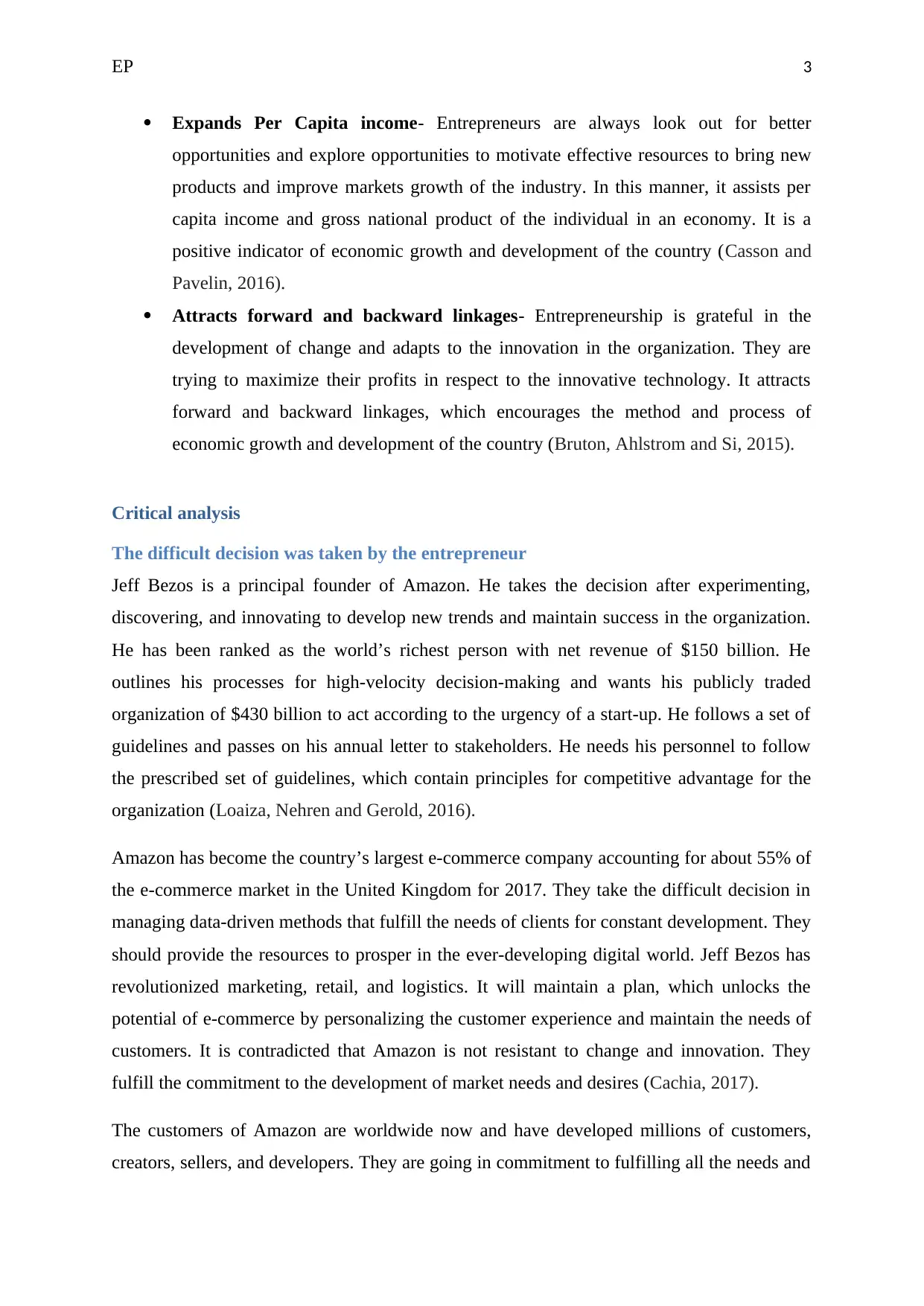
EP 3
Expands Per Capita income- Entrepreneurs are always look out for better
opportunities and explore opportunities to motivate effective resources to bring new
products and improve markets growth of the industry. In this manner, it assists per
capita income and gross national product of the individual in an economy. It is a
positive indicator of economic growth and development of the country (Casson and
Pavelin, 2016).
Attracts forward and backward linkages- Entrepreneurship is grateful in the
development of change and adapts to the innovation in the organization. They are
trying to maximize their profits in respect to the innovative technology. It attracts
forward and backward linkages, which encourages the method and process of
economic growth and development of the country (Bruton, Ahlstrom and Si, 2015).
Critical analysis
The difficult decision was taken by the entrepreneur
Jeff Bezos is a principal founder of Amazon. He takes the decision after experimenting,
discovering, and innovating to develop new trends and maintain success in the organization.
He has been ranked as the world’s richest person with net revenue of $150 billion. He
outlines his processes for high-velocity decision-making and wants his publicly traded
organization of $430 billion to act according to the urgency of a start-up. He follows a set of
guidelines and passes on his annual letter to stakeholders. He needs his personnel to follow
the prescribed set of guidelines, which contain principles for competitive advantage for the
organization (Loaiza, Nehren and Gerold, 2016).
Amazon has become the country’s largest e-commerce company accounting for about 55% of
the e-commerce market in the United Kingdom for 2017. They take the difficult decision in
managing data-driven methods that fulfill the needs of clients for constant development. They
should provide the resources to prosper in the ever-developing digital world. Jeff Bezos has
revolutionized marketing, retail, and logistics. It will maintain a plan, which unlocks the
potential of e-commerce by personalizing the customer experience and maintain the needs of
customers. It is contradicted that Amazon is not resistant to change and innovation. They
fulfill the commitment to the development of market needs and desires (Cachia, 2017).
The customers of Amazon are worldwide now and have developed millions of customers,
creators, sellers, and developers. They are going in commitment to fulfilling all the needs and
Expands Per Capita income- Entrepreneurs are always look out for better
opportunities and explore opportunities to motivate effective resources to bring new
products and improve markets growth of the industry. In this manner, it assists per
capita income and gross national product of the individual in an economy. It is a
positive indicator of economic growth and development of the country (Casson and
Pavelin, 2016).
Attracts forward and backward linkages- Entrepreneurship is grateful in the
development of change and adapts to the innovation in the organization. They are
trying to maximize their profits in respect to the innovative technology. It attracts
forward and backward linkages, which encourages the method and process of
economic growth and development of the country (Bruton, Ahlstrom and Si, 2015).
Critical analysis
The difficult decision was taken by the entrepreneur
Jeff Bezos is a principal founder of Amazon. He takes the decision after experimenting,
discovering, and innovating to develop new trends and maintain success in the organization.
He has been ranked as the world’s richest person with net revenue of $150 billion. He
outlines his processes for high-velocity decision-making and wants his publicly traded
organization of $430 billion to act according to the urgency of a start-up. He follows a set of
guidelines and passes on his annual letter to stakeholders. He needs his personnel to follow
the prescribed set of guidelines, which contain principles for competitive advantage for the
organization (Loaiza, Nehren and Gerold, 2016).
Amazon has become the country’s largest e-commerce company accounting for about 55% of
the e-commerce market in the United Kingdom for 2017. They take the difficult decision in
managing data-driven methods that fulfill the needs of clients for constant development. They
should provide the resources to prosper in the ever-developing digital world. Jeff Bezos has
revolutionized marketing, retail, and logistics. It will maintain a plan, which unlocks the
potential of e-commerce by personalizing the customer experience and maintain the needs of
customers. It is contradicted that Amazon is not resistant to change and innovation. They
fulfill the commitment to the development of market needs and desires (Cachia, 2017).
The customers of Amazon are worldwide now and have developed millions of customers,
creators, sellers, and developers. They are going in commitment to fulfilling all the needs and
Paraphrase This Document
Need a fresh take? Get an instant paraphrase of this document with our AI Paraphraser

EP 4
desires and meet those needs by developing new solutions and creating things better, easier,
cost-effective and faster. They have provided a commitment to make investment decisions in
direction of long-term market development consideration despite short-term consideration.
They have taken difficult decisions to develop a range of business models interventions
concentrate on software, hardware, and new services such as Alexa Artificial Intelligence
invention, smartphone, Kindle e-readers, Amazon fashion, Fire Tablet, TV, and development
to the business-oriented Amazon services. They have taken the decision of starting Amazon
Prime, which is an annual membership platform that incorporates unlimited free shipping and
diversification to a media program with access to immediate streamlining of several
alignments of TV episodes, web series, and movies (Lee and Gino, 2015).
Their main vision is to concentrate on customer relationship, engagement and delivering the
customers with adequate prices, varied selection of merchandise, and convenience. Amazon
has always taken the tough decisions in fulfillment of promise involving alternatives for
shipment notifications, delivery date estimations, and facilities. Their main mission is to
satisfy the customers as well as offer them several promotional offers (Schrift, Kivetz and
Netzer, 2016).
The ethical challenge faced by Amazon: Jeff Bezos
It is stated that Amazon is the world’s leading company of E-commerce industry with an
increased concentration on Machine learning and Artificial Intelligence. It provides the
customers with services, which advertising, customer service, payment processing, and
website development. They concentrate on fulfilling the needs and desires of the customers as
new trends are evolving every time and customers taste and expectation are rapidly changing.
This is the main challenge, which the company is facing as it mainly influences the growth
and profitability of the company (Woo, Keith and Thornton, 2015). Some of them are
mentioned below-
Unreasonably, high ethical standards – Amazon raise the standards, which are
deliberately high on seeking the expectations of people and pressure from
customers to meet the expectations can cause substantial distress. This is a main
ethical challenge, which is faced by the company to handle the increasing demands
of the customers (Ravazzani and Mazzei, 2018).
Unhealthy competition amongst co-associates- It has been reported that Amazon
culture is transparent and expected as the country’s largest retailer, which moves
desires and meet those needs by developing new solutions and creating things better, easier,
cost-effective and faster. They have provided a commitment to make investment decisions in
direction of long-term market development consideration despite short-term consideration.
They have taken difficult decisions to develop a range of business models interventions
concentrate on software, hardware, and new services such as Alexa Artificial Intelligence
invention, smartphone, Kindle e-readers, Amazon fashion, Fire Tablet, TV, and development
to the business-oriented Amazon services. They have taken the decision of starting Amazon
Prime, which is an annual membership platform that incorporates unlimited free shipping and
diversification to a media program with access to immediate streamlining of several
alignments of TV episodes, web series, and movies (Lee and Gino, 2015).
Their main vision is to concentrate on customer relationship, engagement and delivering the
customers with adequate prices, varied selection of merchandise, and convenience. Amazon
has always taken the tough decisions in fulfillment of promise involving alternatives for
shipment notifications, delivery date estimations, and facilities. Their main mission is to
satisfy the customers as well as offer them several promotional offers (Schrift, Kivetz and
Netzer, 2016).
The ethical challenge faced by Amazon: Jeff Bezos
It is stated that Amazon is the world’s leading company of E-commerce industry with an
increased concentration on Machine learning and Artificial Intelligence. It provides the
customers with services, which advertising, customer service, payment processing, and
website development. They concentrate on fulfilling the needs and desires of the customers as
new trends are evolving every time and customers taste and expectation are rapidly changing.
This is the main challenge, which the company is facing as it mainly influences the growth
and profitability of the company (Woo, Keith and Thornton, 2015). Some of them are
mentioned below-
Unreasonably, high ethical standards – Amazon raise the standards, which are
deliberately high on seeking the expectations of people and pressure from
customers to meet the expectations can cause substantial distress. This is a main
ethical challenge, which is faced by the company to handle the increasing demands
of the customers (Ravazzani and Mazzei, 2018).
Unhealthy competition amongst co-associates- It has been reported that Amazon
culture is transparent and expected as the country’s largest retailer, which moves
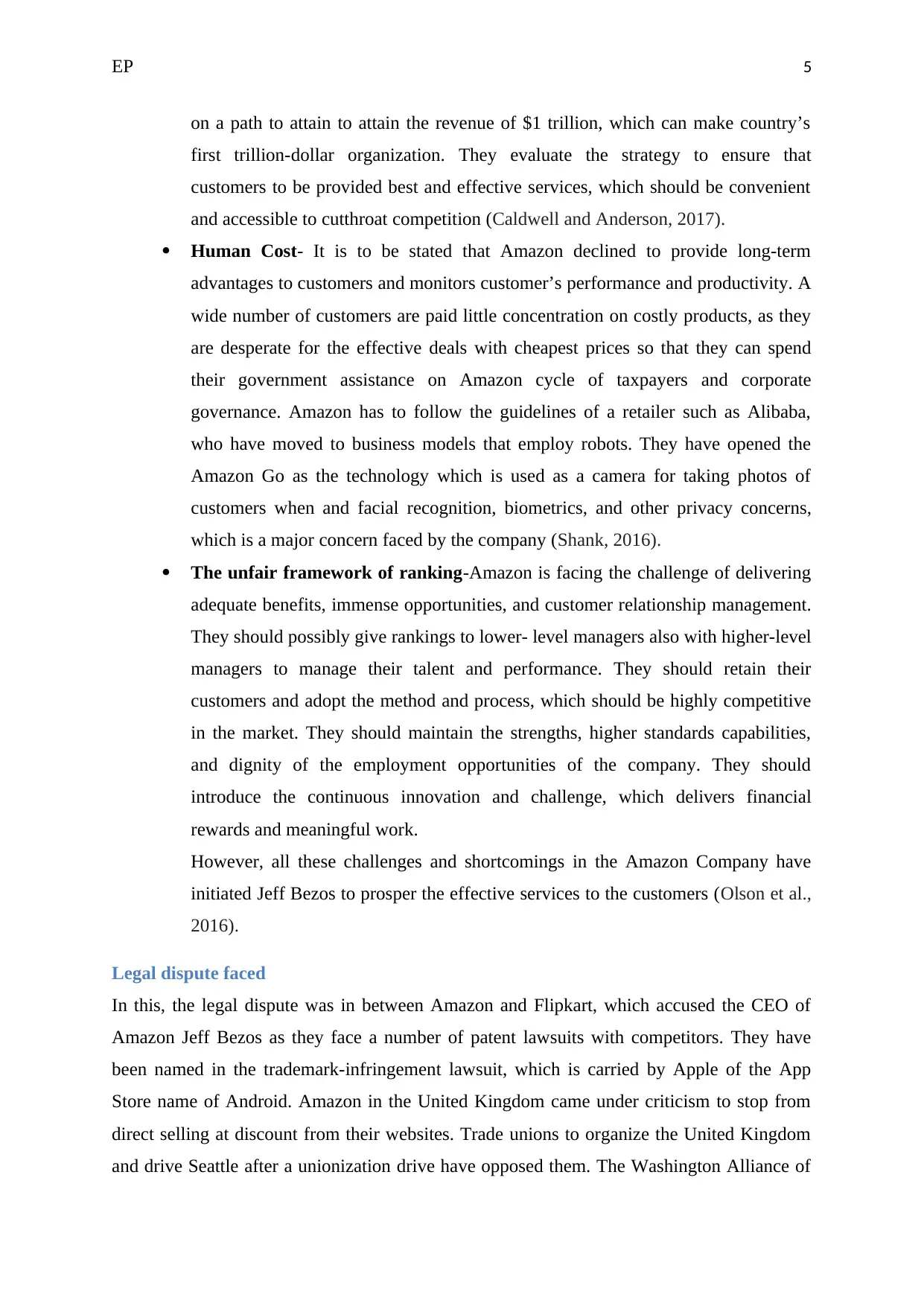
EP 5
on a path to attain to attain the revenue of $1 trillion, which can make country’s
first trillion-dollar organization. They evaluate the strategy to ensure that
customers to be provided best and effective services, which should be convenient
and accessible to cutthroat competition (Caldwell and Anderson, 2017).
Human Cost- It is to be stated that Amazon declined to provide long-term
advantages to customers and monitors customer’s performance and productivity. A
wide number of customers are paid little concentration on costly products, as they
are desperate for the effective deals with cheapest prices so that they can spend
their government assistance on Amazon cycle of taxpayers and corporate
governance. Amazon has to follow the guidelines of a retailer such as Alibaba,
who have moved to business models that employ robots. They have opened the
Amazon Go as the technology which is used as a camera for taking photos of
customers when and facial recognition, biometrics, and other privacy concerns,
which is a major concern faced by the company (Shank, 2016).
The unfair framework of ranking-Amazon is facing the challenge of delivering
adequate benefits, immense opportunities, and customer relationship management.
They should possibly give rankings to lower- level managers also with higher-level
managers to manage their talent and performance. They should retain their
customers and adopt the method and process, which should be highly competitive
in the market. They should maintain the strengths, higher standards capabilities,
and dignity of the employment opportunities of the company. They should
introduce the continuous innovation and challenge, which delivers financial
rewards and meaningful work.
However, all these challenges and shortcomings in the Amazon Company have
initiated Jeff Bezos to prosper the effective services to the customers (Olson et al.,
2016).
Legal dispute faced
In this, the legal dispute was in between Amazon and Flipkart, which accused the CEO of
Amazon Jeff Bezos as they face a number of patent lawsuits with competitors. They have
been named in the trademark-infringement lawsuit, which is carried by Apple of the App
Store name of Android. Amazon in the United Kingdom came under criticism to stop from
direct selling at discount from their websites. Trade unions to organize the United Kingdom
and drive Seattle after a unionization drive have opposed them. The Washington Alliance of
on a path to attain to attain the revenue of $1 trillion, which can make country’s
first trillion-dollar organization. They evaluate the strategy to ensure that
customers to be provided best and effective services, which should be convenient
and accessible to cutthroat competition (Caldwell and Anderson, 2017).
Human Cost- It is to be stated that Amazon declined to provide long-term
advantages to customers and monitors customer’s performance and productivity. A
wide number of customers are paid little concentration on costly products, as they
are desperate for the effective deals with cheapest prices so that they can spend
their government assistance on Amazon cycle of taxpayers and corporate
governance. Amazon has to follow the guidelines of a retailer such as Alibaba,
who have moved to business models that employ robots. They have opened the
Amazon Go as the technology which is used as a camera for taking photos of
customers when and facial recognition, biometrics, and other privacy concerns,
which is a major concern faced by the company (Shank, 2016).
The unfair framework of ranking-Amazon is facing the challenge of delivering
adequate benefits, immense opportunities, and customer relationship management.
They should possibly give rankings to lower- level managers also with higher-level
managers to manage their talent and performance. They should retain their
customers and adopt the method and process, which should be highly competitive
in the market. They should maintain the strengths, higher standards capabilities,
and dignity of the employment opportunities of the company. They should
introduce the continuous innovation and challenge, which delivers financial
rewards and meaningful work.
However, all these challenges and shortcomings in the Amazon Company have
initiated Jeff Bezos to prosper the effective services to the customers (Olson et al.,
2016).
Legal dispute faced
In this, the legal dispute was in between Amazon and Flipkart, which accused the CEO of
Amazon Jeff Bezos as they face a number of patent lawsuits with competitors. They have
been named in the trademark-infringement lawsuit, which is carried by Apple of the App
Store name of Android. Amazon in the United Kingdom came under criticism to stop from
direct selling at discount from their websites. Trade unions to organize the United Kingdom
and drive Seattle after a unionization drive have opposed them. The Washington Alliance of
⊘ This is a preview!⊘
Do you want full access?
Subscribe today to unlock all pages.

Trusted by 1+ million students worldwide
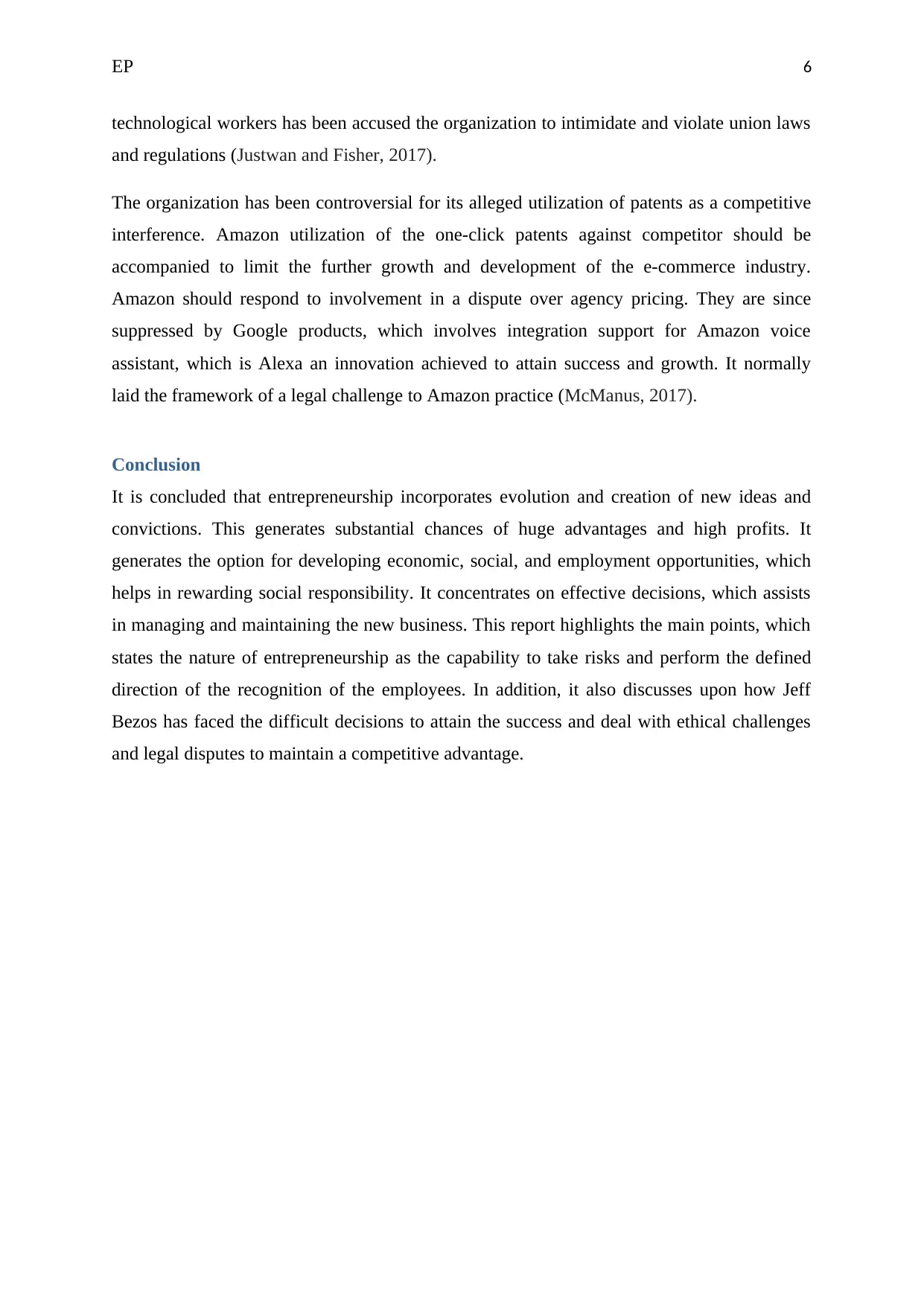
EP 6
technological workers has been accused the organization to intimidate and violate union laws
and regulations (Justwan and Fisher, 2017).
The organization has been controversial for its alleged utilization of patents as a competitive
interference. Amazon utilization of the one-click patents against competitor should be
accompanied to limit the further growth and development of the e-commerce industry.
Amazon should respond to involvement in a dispute over agency pricing. They are since
suppressed by Google products, which involves integration support for Amazon voice
assistant, which is Alexa an innovation achieved to attain success and growth. It normally
laid the framework of a legal challenge to Amazon practice (McManus, 2017).
Conclusion
It is concluded that entrepreneurship incorporates evolution and creation of new ideas and
convictions. This generates substantial chances of huge advantages and high profits. It
generates the option for developing economic, social, and employment opportunities, which
helps in rewarding social responsibility. It concentrates on effective decisions, which assists
in managing and maintaining the new business. This report highlights the main points, which
states the nature of entrepreneurship as the capability to take risks and perform the defined
direction of the recognition of the employees. In addition, it also discusses upon how Jeff
Bezos has faced the difficult decisions to attain the success and deal with ethical challenges
and legal disputes to maintain a competitive advantage.
technological workers has been accused the organization to intimidate and violate union laws
and regulations (Justwan and Fisher, 2017).
The organization has been controversial for its alleged utilization of patents as a competitive
interference. Amazon utilization of the one-click patents against competitor should be
accompanied to limit the further growth and development of the e-commerce industry.
Amazon should respond to involvement in a dispute over agency pricing. They are since
suppressed by Google products, which involves integration support for Amazon voice
assistant, which is Alexa an innovation achieved to attain success and growth. It normally
laid the framework of a legal challenge to Amazon practice (McManus, 2017).
Conclusion
It is concluded that entrepreneurship incorporates evolution and creation of new ideas and
convictions. This generates substantial chances of huge advantages and high profits. It
generates the option for developing economic, social, and employment opportunities, which
helps in rewarding social responsibility. It concentrates on effective decisions, which assists
in managing and maintaining the new business. This report highlights the main points, which
states the nature of entrepreneurship as the capability to take risks and perform the defined
direction of the recognition of the employees. In addition, it also discusses upon how Jeff
Bezos has faced the difficult decisions to attain the success and deal with ethical challenges
and legal disputes to maintain a competitive advantage.
Paraphrase This Document
Need a fresh take? Get an instant paraphrase of this document with our AI Paraphraser
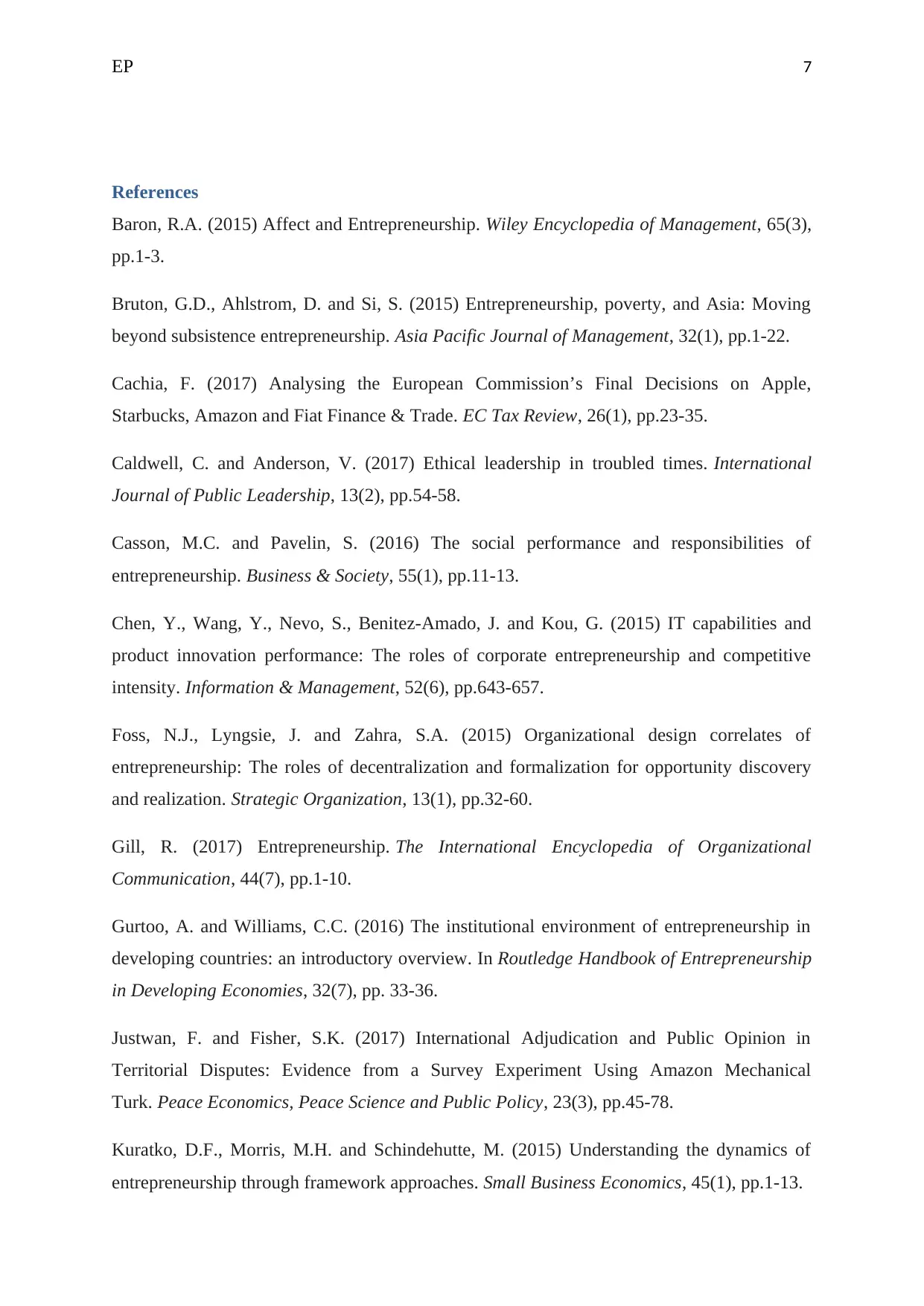
EP 7
References
Baron, R.A. (2015) Affect and Entrepreneurship. Wiley Encyclopedia of Management, 65(3),
pp.1-3.
Bruton, G.D., Ahlstrom, D. and Si, S. (2015) Entrepreneurship, poverty, and Asia: Moving
beyond subsistence entrepreneurship. Asia Pacific Journal of Management, 32(1), pp.1-22.
Cachia, F. (2017) Analysing the European Commission’s Final Decisions on Apple,
Starbucks, Amazon and Fiat Finance & Trade. EC Tax Review, 26(1), pp.23-35.
Caldwell, C. and Anderson, V. (2017) Ethical leadership in troubled times. International
Journal of Public Leadership, 13(2), pp.54-58.
Casson, M.C. and Pavelin, S. (2016) The social performance and responsibilities of
entrepreneurship. Business & Society, 55(1), pp.11-13.
Chen, Y., Wang, Y., Nevo, S., Benitez-Amado, J. and Kou, G. (2015) IT capabilities and
product innovation performance: The roles of corporate entrepreneurship and competitive
intensity. Information & Management, 52(6), pp.643-657.
Foss, N.J., Lyngsie, J. and Zahra, S.A. (2015) Organizational design correlates of
entrepreneurship: The roles of decentralization and formalization for opportunity discovery
and realization. Strategic Organization, 13(1), pp.32-60.
Gill, R. (2017) Entrepreneurship. The International Encyclopedia of Organizational
Communication, 44(7), pp.1-10.
Gurtoo, A. and Williams, C.C. (2016) The institutional environment of entrepreneurship in
developing countries: an introductory overview. In Routledge Handbook of Entrepreneurship
in Developing Economies, 32(7), pp. 33-36.
Justwan, F. and Fisher, S.K. (2017) International Adjudication and Public Opinion in
Territorial Disputes: Evidence from a Survey Experiment Using Amazon Mechanical
Turk. Peace Economics, Peace Science and Public Policy, 23(3), pp.45-78.
Kuratko, D.F., Morris, M.H. and Schindehutte, M. (2015) Understanding the dynamics of
entrepreneurship through framework approaches. Small Business Economics, 45(1), pp.1-13.
References
Baron, R.A. (2015) Affect and Entrepreneurship. Wiley Encyclopedia of Management, 65(3),
pp.1-3.
Bruton, G.D., Ahlstrom, D. and Si, S. (2015) Entrepreneurship, poverty, and Asia: Moving
beyond subsistence entrepreneurship. Asia Pacific Journal of Management, 32(1), pp.1-22.
Cachia, F. (2017) Analysing the European Commission’s Final Decisions on Apple,
Starbucks, Amazon and Fiat Finance & Trade. EC Tax Review, 26(1), pp.23-35.
Caldwell, C. and Anderson, V. (2017) Ethical leadership in troubled times. International
Journal of Public Leadership, 13(2), pp.54-58.
Casson, M.C. and Pavelin, S. (2016) The social performance and responsibilities of
entrepreneurship. Business & Society, 55(1), pp.11-13.
Chen, Y., Wang, Y., Nevo, S., Benitez-Amado, J. and Kou, G. (2015) IT capabilities and
product innovation performance: The roles of corporate entrepreneurship and competitive
intensity. Information & Management, 52(6), pp.643-657.
Foss, N.J., Lyngsie, J. and Zahra, S.A. (2015) Organizational design correlates of
entrepreneurship: The roles of decentralization and formalization for opportunity discovery
and realization. Strategic Organization, 13(1), pp.32-60.
Gill, R. (2017) Entrepreneurship. The International Encyclopedia of Organizational
Communication, 44(7), pp.1-10.
Gurtoo, A. and Williams, C.C. (2016) The institutional environment of entrepreneurship in
developing countries: an introductory overview. In Routledge Handbook of Entrepreneurship
in Developing Economies, 32(7), pp. 33-36.
Justwan, F. and Fisher, S.K. (2017) International Adjudication and Public Opinion in
Territorial Disputes: Evidence from a Survey Experiment Using Amazon Mechanical
Turk. Peace Economics, Peace Science and Public Policy, 23(3), pp.45-78.
Kuratko, D.F., Morris, M.H. and Schindehutte, M. (2015) Understanding the dynamics of
entrepreneurship through framework approaches. Small Business Economics, 45(1), pp.1-13.
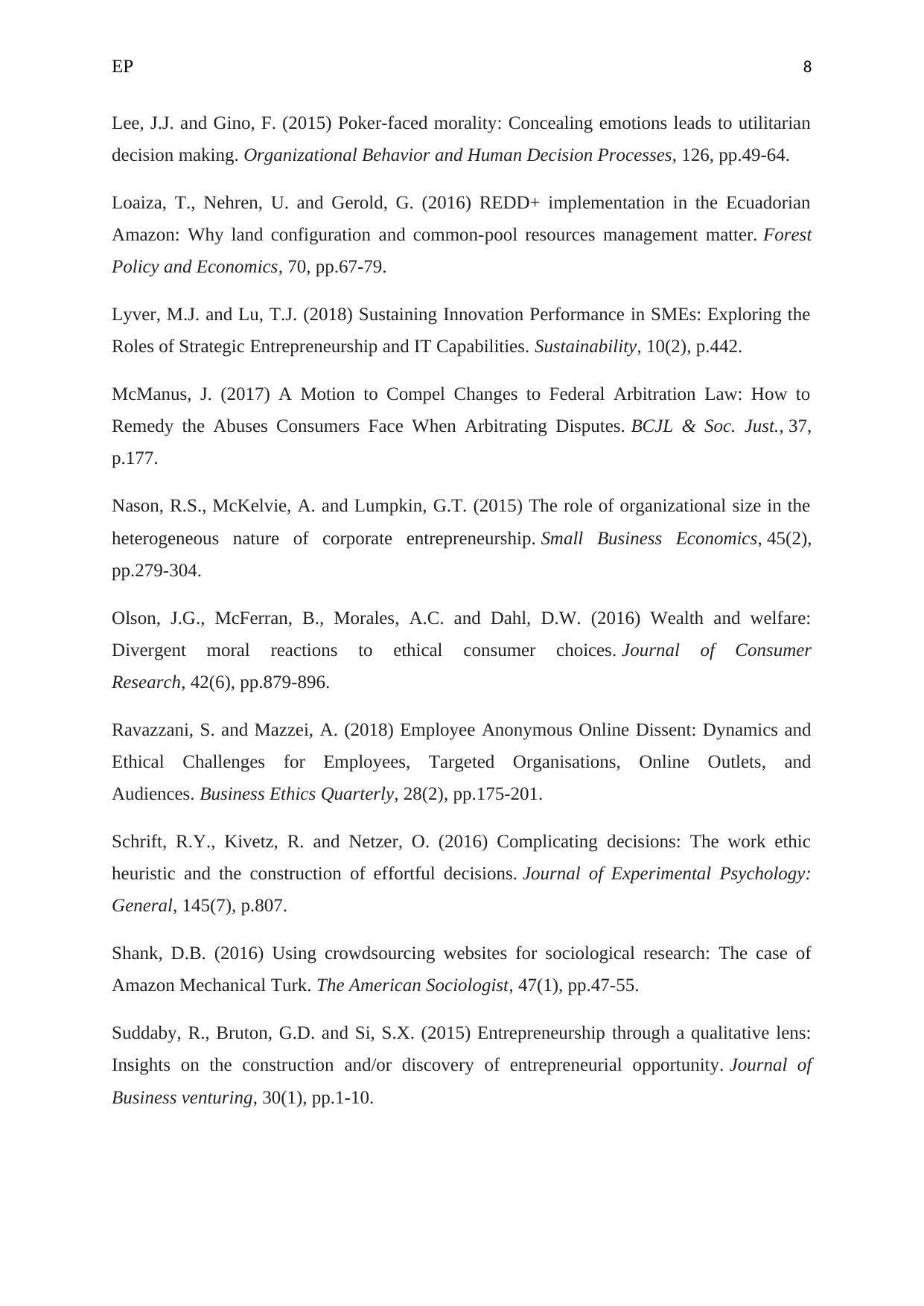
EP 8
Lee, J.J. and Gino, F. (2015) Poker-faced morality: Concealing emotions leads to utilitarian
decision making. Organizational Behavior and Human Decision Processes, 126, pp.49-64.
Loaiza, T., Nehren, U. and Gerold, G. (2016) REDD+ implementation in the Ecuadorian
Amazon: Why land configuration and common-pool resources management matter. Forest
Policy and Economics, 70, pp.67-79.
Lyver, M.J. and Lu, T.J. (2018) Sustaining Innovation Performance in SMEs: Exploring the
Roles of Strategic Entrepreneurship and IT Capabilities. Sustainability, 10(2), p.442.
McManus, J. (2017) A Motion to Compel Changes to Federal Arbitration Law: How to
Remedy the Abuses Consumers Face When Arbitrating Disputes. BCJL & Soc. Just., 37,
p.177.
Nason, R.S., McKelvie, A. and Lumpkin, G.T. (2015) The role of organizational size in the
heterogeneous nature of corporate entrepreneurship. Small Business Economics, 45(2),
pp.279-304.
Olson, J.G., McFerran, B., Morales, A.C. and Dahl, D.W. (2016) Wealth and welfare:
Divergent moral reactions to ethical consumer choices. Journal of Consumer
Research, 42(6), pp.879-896.
Ravazzani, S. and Mazzei, A. (2018) Employee Anonymous Online Dissent: Dynamics and
Ethical Challenges for Employees, Targeted Organisations, Online Outlets, and
Audiences. Business Ethics Quarterly, 28(2), pp.175-201.
Schrift, R.Y., Kivetz, R. and Netzer, O. (2016) Complicating decisions: The work ethic
heuristic and the construction of effortful decisions. Journal of Experimental Psychology:
General, 145(7), p.807.
Shank, D.B. (2016) Using crowdsourcing websites for sociological research: The case of
Amazon Mechanical Turk. The American Sociologist, 47(1), pp.47-55.
Suddaby, R., Bruton, G.D. and Si, S.X. (2015) Entrepreneurship through a qualitative lens:
Insights on the construction and/or discovery of entrepreneurial opportunity. Journal of
Business venturing, 30(1), pp.1-10.
Lee, J.J. and Gino, F. (2015) Poker-faced morality: Concealing emotions leads to utilitarian
decision making. Organizational Behavior and Human Decision Processes, 126, pp.49-64.
Loaiza, T., Nehren, U. and Gerold, G. (2016) REDD+ implementation in the Ecuadorian
Amazon: Why land configuration and common-pool resources management matter. Forest
Policy and Economics, 70, pp.67-79.
Lyver, M.J. and Lu, T.J. (2018) Sustaining Innovation Performance in SMEs: Exploring the
Roles of Strategic Entrepreneurship and IT Capabilities. Sustainability, 10(2), p.442.
McManus, J. (2017) A Motion to Compel Changes to Federal Arbitration Law: How to
Remedy the Abuses Consumers Face When Arbitrating Disputes. BCJL & Soc. Just., 37,
p.177.
Nason, R.S., McKelvie, A. and Lumpkin, G.T. (2015) The role of organizational size in the
heterogeneous nature of corporate entrepreneurship. Small Business Economics, 45(2),
pp.279-304.
Olson, J.G., McFerran, B., Morales, A.C. and Dahl, D.W. (2016) Wealth and welfare:
Divergent moral reactions to ethical consumer choices. Journal of Consumer
Research, 42(6), pp.879-896.
Ravazzani, S. and Mazzei, A. (2018) Employee Anonymous Online Dissent: Dynamics and
Ethical Challenges for Employees, Targeted Organisations, Online Outlets, and
Audiences. Business Ethics Quarterly, 28(2), pp.175-201.
Schrift, R.Y., Kivetz, R. and Netzer, O. (2016) Complicating decisions: The work ethic
heuristic and the construction of effortful decisions. Journal of Experimental Psychology:
General, 145(7), p.807.
Shank, D.B. (2016) Using crowdsourcing websites for sociological research: The case of
Amazon Mechanical Turk. The American Sociologist, 47(1), pp.47-55.
Suddaby, R., Bruton, G.D. and Si, S.X. (2015) Entrepreneurship through a qualitative lens:
Insights on the construction and/or discovery of entrepreneurial opportunity. Journal of
Business venturing, 30(1), pp.1-10.
⊘ This is a preview!⊘
Do you want full access?
Subscribe today to unlock all pages.

Trusted by 1+ million students worldwide

EP 9
Woo, S.E., Keith, M. and Thornton, M.A. (2015) Amazon Mechanical Turk for industrial and
organizational psychology: Advantages, challenges, and practical
recommendations. Industrial and Organizational Psychology, 8(2), pp.171-179.
Woo, S.E., Keith, M. and Thornton, M.A. (2015) Amazon Mechanical Turk for industrial and
organizational psychology: Advantages, challenges, and practical
recommendations. Industrial and Organizational Psychology, 8(2), pp.171-179.
1 out of 10
Related Documents
Your All-in-One AI-Powered Toolkit for Academic Success.
+13062052269
info@desklib.com
Available 24*7 on WhatsApp / Email
![[object Object]](/_next/static/media/star-bottom.7253800d.svg)
Unlock your academic potential
Copyright © 2020–2026 A2Z Services. All Rights Reserved. Developed and managed by ZUCOL.





